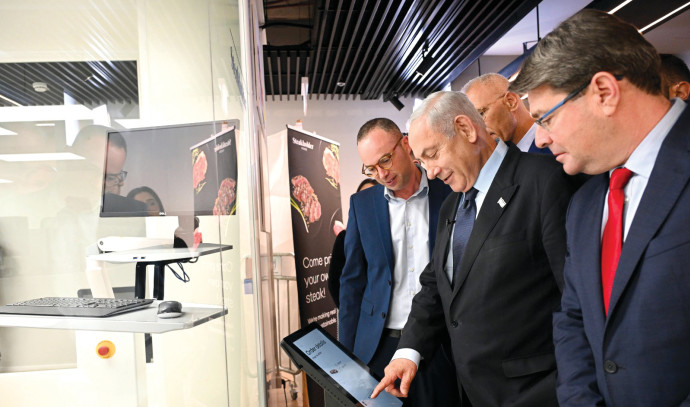Israel today boasts more than 250 start-ups in the field of food tech, according to the Tel Aviv-based NGO, Start-Up Nation Central. “The Israeli food-tech industry has shown immense promise in shaping a resilient and efficient global food system,” it says. “Start-up Nation Central fosters collaborations and facilitates the growth of promising businesses that contribute to a sustainable future. The organization focuses on supporting businesses with cutting-edge technology that are addressing the most pressing global challenges, including food security and environmental harm.”
Israel is second only to the US when it comes to start-ups connected to alternative protein, generating more than a billion dollars from investors since 2020. Several of the top cultivated meat companies in the world began in Israel, such as Aleph Farms and Steakholder Foods, while companies such as Remilk and Eggmented Reality are global leaders in replacing milk and eggs in everyday foods.
Prime Minister Benjamin Netanyahu was the world’s first head of government to publicly taste cultivated meat, sampling Aleph Farms steak on December 7, 2020, and pledging that “Israel will become a powerhouse for alternative meat and alternative protein.” On April 19 this year, Netanyahu visited Steakholder Foods in Rehovot, a company that uses 3D printing to produce real meat from ethically harvested cells, taking the opportunity to announce that Israel would give regulatory approval for the production of non-animal cow’s milk.
During the visit, the company printed its first cultured fish, which the premier tried. “Today we ate fish produced without fish, and meat produced without cows. This is a global revolution,” Netanyahu said. “Israel is a world leader in the field of alternative protein, and we will make sure that it continues to lead.”
Food tech will boost Israel’s economy
Innovation, Science, and Technology Minister Ofir Akunis, who accompanied Netanyahu on the tour, tells Maayan Hoffman in this issue: “Food tech is an industry with great potential that will make a huge contribution to Israel’s economy in the coming years, similar to cyber in the previous decade.”
While Start-Up Nation Central’s summary of Israeli tech shows a recent slump, with investment deals in the food-tech sector plunging from $600 million in the first half of 2022 to $200 million in the same period this year, the outlook remains promising. In agritech, for example, its latest report reveals that investments in advanced rounds maintained stability, while the volume of investments in the field doubled from the first to the second quarter of 2023.
Israel’s food-tech sector receives extensive state support, from government ministries and the Israel Innovation Authority. Boosting the sector are accelerators and incubators such as Fresh Start and The Kitchen, public market fundraising from companies like OurCrowd and JVP, investment from Israeli corporations such as Tnuva and Strauss, and multinationals like Nestlé and Unilever, as well as contributions from Israeli academic institutions such as the Technion and the Weizmann Institute.
“Food tech in general is a growing trend around the world, and there are specific areas where Israel especially stands out,” independent start-up advisor Amir Mizroch wrote in Forbes in an article titled, “Something Big Is Cooking In Israel’s Food Tech Kitchen.”
Among the innovative food tech start-ups listed by Start-Up Nation Central are Rehovot-based Oshi, which has developed a plant-based alternative protein that doesn’t rely on animal products at all; and Jerusalem-based Ambrosia Bio, which is developing a healthy sugar substitute that has the potential to dramatically improve public health.
This is just a taste of what Israeli food tech has to offer. We are confident that this issue of The Jerusalem Report will whet your appetite to learn more.



